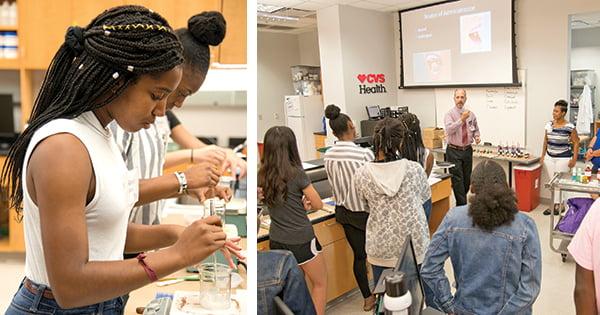Pharmacy Program Offers Career Insights to Underrepresented Minorities
by Kathy Grear 10/07/2018
Alexis Wood, a student in the MUSC College of Pharmacy PharmDamentals Program
Charleston, SC — PharmDamentals was meant for students like Alexis Wood. A rising senior in the International Baccalaureate program at James Island Charter High School, Wood discovered new possibilities in pharmacy careers after attending a half-day program at the Medical University of South Carolina (MUSC) College of Pharmacy on August 10.
“I’ve thought about a career in pediatric cardiology,” she said. “I’ll definitely have to consider pharmacy now.”
Designed to engage underrepresented minority (URM) high school students interested in science/ technology/ engineering/ math or healthcare careers, PharmDamentals featured a panel discussion and question-and-answer session with three MUSC pharmacy alumni, moderated by a current pharmacy student. After lunch with MUSC pharmacy faculty and students, participants went to the laboratory to conduct experiments in basic science and compounding.
Priscilla Burgess was one of the current MUSC pharmacy students helping to design and promote the event, which was a joint recommendation of the College’s URM Advisory Panel and the Diversity and Inclusion Committee.
“Visualizing is important,” said Burgess, who serves on both committees and was the panel moderator. “We want them to be able to see students who look like them in a place they might want to be someday.”
The “Pharmacy Pathways” alumni panel featured LaDavia Just ’06, regional director of the client success group for PipelineRx; Pam Mazyck R 02, clinical specialist at MUSC; and Marc Lapointe ’95, professor of clinical pharmacy and outcomes sciences. The lab sessions were hosted by Eduardo Maldonado, assistant professor of drug discovery and biomedical sciences, and David Shirley ’02, assistant professor of clinical pharmacy and outcomes sciences.
After a tour of campus, the students returned for a final “Q-and-A with the Dean” and were then presented certificates for completing the PharmDamentals program.
“Welcoming diversity and creating an inclusive environment for all our students is part of our calling,” said Philip D. Hall, dean of the MUSC College of Pharmacy. “If an early, inside look at what a pharmacy career can offer encourages more underrepresented minorities to pursue it, we’ll do whatever we can to provide that perspective. We want to get rid of the ‘under’ in ‘underrepresented.’ ”
Last year, the College established two endowed minority scholarships to encourage more underrepresented minority applicants. The entering Class of 2022 has the College’s highest percent underrepresented minority since reporting began.
The Pharmacy Pathways panel addressed a number of issues such as how the panelists decided to go to pharmacy school, what obstacles they encountered, what a typical day in their current job was like, their favorite and least favorites aspects of it, and other insights.
Between them, they represented some of the breadth of the pharmacy profession. They also represented its versatility.
“A PharmD is one of the most dynamic doctoral degrees you can have,” Burgess said. “I’ve met so many pharmacists in the last three years and none of them are doing the same thing when they started.”
For high school students still deciding which field to study, that mix of focus and freedom can be an appealing factor. The objective of PharmDamentals is to introduce directly to potential underrepresented minority pharmacy students aspects of a pharmacy career they may not have considered, such as its versatility.
As far as Wood is concerned, it succeeded.
“I didn’t realize how versatile pharmacy can be,” she said. “I thought the panel discussion was interesting and liked how the lab work was hands on. I had fun today.”
About MUSC
Founded in 1824 in Charleston, The Medical University of South Carolina is the oldest medical school in the South. Today, MUSC continues the tradition of excellence in education, research, and patient care. MUSC educates and trains more than 3,000 students and 700 residents in six colleges (Dental Medicine, Graduate Studies, Health Professions, Medicine, Nursing, and Pharmacy), and has nearly 14,000 employees, including approximately 1,500 faculty members. As the largest non-federal employer in Charleston, the university and its affiliates have collective annual budgets in excess of $2.6 billion, with an annual economic impact of more than $3.8 billion and annual research funding in excess of $250 million. MUSC operates a 700-bed medical center, which includes a nationally recognized children’s hospital, the Ashley River Tower (cardiovascular, digestive disease, and surgical oncology), Hollings Cancer Center (a National Cancer Institute-designated center), Level I trauma center, Institute of Psychiatry, and the state’s only transplant center. In 2018, for the fourth consecutive year, U.S. News & World Report named MUSC Health the number one hospital in South Carolina. For more information on academic programs or clinical services, visit www.musc.edu. For more information on hospital patient services, visit www.muschealth.org.



No Comments so far
Jump into a conversationNo Comments Yet!
You can be the one to start a conversation.Only registered users can comment.